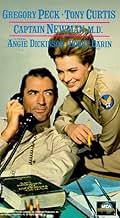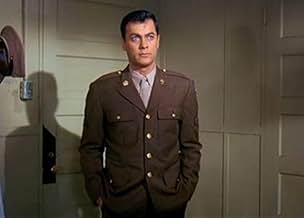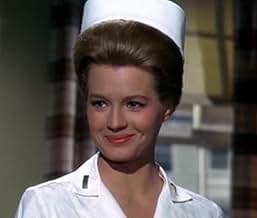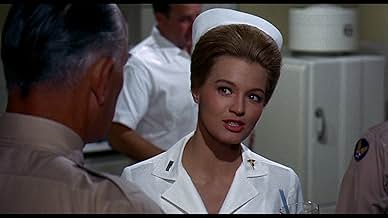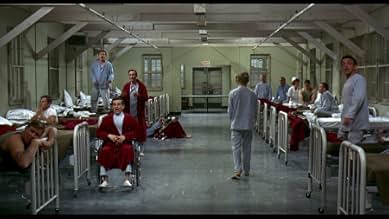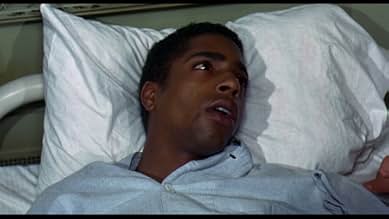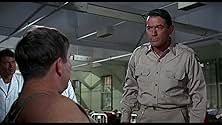IMDb RATING
6.9/10
3.1K
YOUR RATING
In 1944, an Army doctor is in charge of a neuropsychiatric ward at an Army Air Corps hospital in Arizona, and he must deal with a variety of tough cases.In 1944, an Army doctor is in charge of a neuropsychiatric ward at an Army Air Corps hospital in Arizona, and he must deal with a variety of tough cases.In 1944, an Army doctor is in charge of a neuropsychiatric ward at an Army Air Corps hospital in Arizona, and he must deal with a variety of tough cases.
- Nominated for 3 Oscars
- 10 nominations total
Charlie Briggs
- Gorkow
- (as Charles Briggs)
Featured reviews
For reasons I don't understand Captain Newman MD has always been singled out for criticism, most particularly directed at Gregory Peck saying he's too stiff for comedy. I don't agree on a number of levels and this is one of my favorite films with him.
First and foremost Peck's role is not one of comedy. What he does in the film is serve as Tony Curtis's straight man. Now his role is a comic one and very funny indeed.
Peck runs the psychiatric ward in an Army Air Corps Hospital out in the Arizona desert during World War II. There's no way a man like Peck would be in the command of George S. Patton who just didn't believe in Peck's whole profession. And in Patton like fashion if someone isn't shipped back to command in twelve weeks, Peck hears about it.
Captain Newman, MD is a serious film about such people and they are at the heart of the story with Peck trying his best to fix the broken minds and psyches in our Armed Forces. Three of his cases are the drunken, guitar playing corporal Bobby Darin, the catatonic flier Robert Duvall, and Eddie Albert the colonel who has gone psychotic. Peck has a mixed record of success with these three and with others in his ward.
Bobby Darin got an Academy Award nomination for Best Supporting Actor, it's a fine performance but he lost that year to Melvyn Douglas for Hud. But personally I feel that Eddie Albert stole Captain Newman, MD from the rest of the cast. It's a tossup between this role and Attack for the best performances of Albert's carer.
Robert Duvall always credited Peck with giving him a good start to his long career with key roles in To Kill A Mockingbird and Captain Newman, MD. Funny thing is that Duvall has little dialog here and none in To Kill A Mockingbird. Far from the well spoken attorney who was consigliere to The Godfather. He's matched in his performance by his wife played by Bethel Leslie who is apparently much influenced by Grace Kelly in her performance. She's his prim and proper wife who tries to stir his interest in an attempt at an unusual kind of shock therapy.
Aiding Peck in his treatment of his patients are nurses Angie Dickinson and Jane Withers and orderlies Tony Curtis and Larry Storch. In his memoirs Tony Curtis says that he got along very well with Gregory Peck who he says was one of the best class acts in Hollywood. He didn't get along all that well with director David Miller who wanted Curtis to be more ethnic in his interpretation of Corporal Jackson Leibowitz. Curtis won out and I think he was right in this case. A friend of Tony Curtis's since childhood is Larry Storch and because of that Storch appears in a few films with Curtis. As Peck was Tony's straight man, Storch becomes his comic foil in a couple of scenes and they work well together.
Captain Newman, MD is a classic film, both entertaining and thought provoking, about the treatment of mental breakdowns among our military. As we certainly now are a country at war, Captain Newman, MD has a relevancy today that is timely. Absolutely do not miss it when it is broadcast.
First and foremost Peck's role is not one of comedy. What he does in the film is serve as Tony Curtis's straight man. Now his role is a comic one and very funny indeed.
Peck runs the psychiatric ward in an Army Air Corps Hospital out in the Arizona desert during World War II. There's no way a man like Peck would be in the command of George S. Patton who just didn't believe in Peck's whole profession. And in Patton like fashion if someone isn't shipped back to command in twelve weeks, Peck hears about it.
Captain Newman, MD is a serious film about such people and they are at the heart of the story with Peck trying his best to fix the broken minds and psyches in our Armed Forces. Three of his cases are the drunken, guitar playing corporal Bobby Darin, the catatonic flier Robert Duvall, and Eddie Albert the colonel who has gone psychotic. Peck has a mixed record of success with these three and with others in his ward.
Bobby Darin got an Academy Award nomination for Best Supporting Actor, it's a fine performance but he lost that year to Melvyn Douglas for Hud. But personally I feel that Eddie Albert stole Captain Newman, MD from the rest of the cast. It's a tossup between this role and Attack for the best performances of Albert's carer.
Robert Duvall always credited Peck with giving him a good start to his long career with key roles in To Kill A Mockingbird and Captain Newman, MD. Funny thing is that Duvall has little dialog here and none in To Kill A Mockingbird. Far from the well spoken attorney who was consigliere to The Godfather. He's matched in his performance by his wife played by Bethel Leslie who is apparently much influenced by Grace Kelly in her performance. She's his prim and proper wife who tries to stir his interest in an attempt at an unusual kind of shock therapy.
Aiding Peck in his treatment of his patients are nurses Angie Dickinson and Jane Withers and orderlies Tony Curtis and Larry Storch. In his memoirs Tony Curtis says that he got along very well with Gregory Peck who he says was one of the best class acts in Hollywood. He didn't get along all that well with director David Miller who wanted Curtis to be more ethnic in his interpretation of Corporal Jackson Leibowitz. Curtis won out and I think he was right in this case. A friend of Tony Curtis's since childhood is Larry Storch and because of that Storch appears in a few films with Curtis. As Peck was Tony's straight man, Storch becomes his comic foil in a couple of scenes and they work well together.
Captain Newman, MD is a classic film, both entertaining and thought provoking, about the treatment of mental breakdowns among our military. As we certainly now are a country at war, Captain Newman, MD has a relevancy today that is timely. Absolutely do not miss it when it is broadcast.
I enjoyed the movie very much. Of course I am one of those baby boomer's born after World War II. So I and my siblings would play war (those were the days when parents would remind their charges that movies were make believe). So being 12 years old at the time, "Captain Newman, M.D." was one of the few adult films that I as a kid that I enjoyed and understood. Even being that young I had for the most part enjoyed, Gregory Peck, Tony Curtis, Bobby Darin and Eddie Albert in their respective rolls. I felt for Eddie's character as a Colonel Norval Algate Bliss. Having sent his people out to death, it was a memory his character could not live with. To me, he played the character well, not just acting, but because he had "been there, done that" and so he had seen his share of death during World War II at Tarawa. I would recommend this movie to anyone who enjoys acting at its best.
Captain Newman, M.D. (1963)
Almost twenty years after WWII, a movie that reflected the growing public admission that there were many psychological victims from the war, often ignored or minimized at the time (unlike, say, Vietnam, which was just unfolding, and which demanded a different kind of accountability). And this one is set in the middle of the war, though in an Arizona military hospital far from direct action.
The star is certainly the title character, played by Gregory Peck, and Peck is his usual highly respectable self, moral and a natural leader, but likable and willing to take chances, too. That is, an ideal male, in many ways, the kind you might like to have as President, or at least the chief doctor in your hospital. He is, in particular, in charge of the mental ward, and his main intern played by Tony Curtis steals the show, on purpose. While much of the movie is funny, or at least peculiar enough to be ironic and wry, there are moments of heartfelt tragedy and even heartwrenching trauma (especially when a couple of the inmates go berserk). Third in line is a strong, sympathetic nurse (Angie Dickinson) and these three run the ward with unusual verve and intelligence. It clearly is a case in favor of the military giving good psych treatment.
There are several interesting patients, as well as a band of Italian POWs brought in for some nice comic relief (and for a reminder that people are people, even if they are enemies). The most famous and unusual is played by Bobby Darin, who I just saw in another movie from the period where he played a patient in an army psych ward, the riveting "Pressure Point." This is a whole different kind of movie, though Darin's performance is strong in similar ways in both cases. Here he even plays an impressive ten seconds on the guitar, and if you watch closely you'll see it's the real deal, not recorded later.
The color in the filming is unusually clear and vivid in a realistic way, and Russell Metty behind the camera has made a number of really solid, beautiful, richly colorful films ("That Touch of Mink" and "Imitation of Life" as well as the more earthy "The Misfits"). The lighting is usually fairly bright and broad, though there are some scenes pumped up with shadows. A couple of shots toward the end are oddly filmed against an obvious back projections (when they are rounding up the sheep) which is too bad because otherwise the standards are very high. Director David Miller isn't especially legendary, but he has one terrific film I'd recommend to anyone, "Sudden Fear" made a decade earlier. Here he shows general high production values and a sense of humor (mostly through the endlessly lively Curtis).
A nice little colorful film with a gently persuasive subtext.
Almost twenty years after WWII, a movie that reflected the growing public admission that there were many psychological victims from the war, often ignored or minimized at the time (unlike, say, Vietnam, which was just unfolding, and which demanded a different kind of accountability). And this one is set in the middle of the war, though in an Arizona military hospital far from direct action.
The star is certainly the title character, played by Gregory Peck, and Peck is his usual highly respectable self, moral and a natural leader, but likable and willing to take chances, too. That is, an ideal male, in many ways, the kind you might like to have as President, or at least the chief doctor in your hospital. He is, in particular, in charge of the mental ward, and his main intern played by Tony Curtis steals the show, on purpose. While much of the movie is funny, or at least peculiar enough to be ironic and wry, there are moments of heartfelt tragedy and even heartwrenching trauma (especially when a couple of the inmates go berserk). Third in line is a strong, sympathetic nurse (Angie Dickinson) and these three run the ward with unusual verve and intelligence. It clearly is a case in favor of the military giving good psych treatment.
There are several interesting patients, as well as a band of Italian POWs brought in for some nice comic relief (and for a reminder that people are people, even if they are enemies). The most famous and unusual is played by Bobby Darin, who I just saw in another movie from the period where he played a patient in an army psych ward, the riveting "Pressure Point." This is a whole different kind of movie, though Darin's performance is strong in similar ways in both cases. Here he even plays an impressive ten seconds on the guitar, and if you watch closely you'll see it's the real deal, not recorded later.
The color in the filming is unusually clear and vivid in a realistic way, and Russell Metty behind the camera has made a number of really solid, beautiful, richly colorful films ("That Touch of Mink" and "Imitation of Life" as well as the more earthy "The Misfits"). The lighting is usually fairly bright and broad, though there are some scenes pumped up with shadows. A couple of shots toward the end are oddly filmed against an obvious back projections (when they are rounding up the sheep) which is too bad because otherwise the standards are very high. Director David Miller isn't especially legendary, but he has one terrific film I'd recommend to anyone, "Sudden Fear" made a decade earlier. Here he shows general high production values and a sense of humor (mostly through the endlessly lively Curtis).
A nice little colorful film with a gently persuasive subtext.
Hot off "To Kill a Mockingbird", Gregory Peck played another really good role in David Miller's "Captain Newman, M.D.". This time he's a psychiatrist on an army base in WWII having to deal with what we now recognize as PTSD, while also dealing with the military bureaucracy. In a way, the movie almost seems like a preview of the war in which the United States was about to mire itself (the Vietnam War). Fine support comes from Tony Curtis as a streetwise corporal and Angie Dickinson as a tolerant lieutenant, along with Eddie Albert, Bobby Darin and Robert Duvall as Peck's damaged patients.
Without a doubt this is one that I recommend. Maybe it's not as good as "To Kill a Mockingbird" - a little silly at times - but still a solid look at the world with which the psychiatrist has to put up.
Also starring Bethel Leslie, James Gregory, Robert F. Simon, Dick Sargent*, Larry Storch, Jane Withers and Vito Scotti.
*Robert F. Simon and Dick Sargent played father and son on "Bewitched". Also, Vito Scotti guest-starred on an episode.
Without a doubt this is one that I recommend. Maybe it's not as good as "To Kill a Mockingbird" - a little silly at times - but still a solid look at the world with which the psychiatrist has to put up.
Also starring Bethel Leslie, James Gregory, Robert F. Simon, Dick Sargent*, Larry Storch, Jane Withers and Vito Scotti.
*Robert F. Simon and Dick Sargent played father and son on "Bewitched". Also, Vito Scotti guest-starred on an episode.
Though highly entertaining at many points (largely due to the antics of Cpl. Jackson 'Jake' Leibowitz and his band of merry Italian POWs who sing semitic native American songs--don't ask, don't try to figure it out, just see the movie--and even some of the very well executed art of subtle humor carried out by Capt. Newman, MD) this movie manages to have a quite serious theme at its core . . . the intense psychological effects on a soldier's mind which can be brought upon by the reality of war. It's refreshing to see a movie from this period that touches on these more delicate, in-depth themes of war rather than portraying the glories of war as so many other films contemporary to this one do. Not to say that all other films from this era or before don't touch on these themes. One other great example would be 1949's Twelve O'Clock High, also starring Gregory Peck. The dialog is consistently fresh, and I found the pace to move along quite nicely. This movie features a superb cast who performs wonderfully throughout the film. If you like serious, thought-provoking, emotional themes, yet also enjoy lots of good laughs, then I would recommend seeing this film.
*On a side note, given the fact that this movie--from my perspective--seems to be somewhat ahead of its time in subject matter, directing style in some of the scenes, and even some concepts not too common during the 60s, it's interesting to point out that the movie still portrays the classical female role in life. There is one line that is spoken by Lt. Francie Corum that shows this perfectly. The line doesn't seem to be necessary and doesn't really fit with what the characters are discussing. I won't tell you the line, but try to find it for some fun.
*On a side note, given the fact that this movie--from my perspective--seems to be somewhat ahead of its time in subject matter, directing style in some of the scenes, and even some concepts not too common during the 60s, it's interesting to point out that the movie still portrays the classical female role in life. There is one line that is spoken by Lt. Francie Corum that shows this perfectly. The line doesn't seem to be necessary and doesn't really fit with what the characters are discussing. I won't tell you the line, but try to find it for some fun.
Did you know
- TriviaAuthor Leo Rosten based the character of Captain Josiah Newman on his friend, Captain Ralph Greenson, a U.S. Army psychiatrist who worked with traumatized airmen during World War II, and was one of the first to identify the symptoms of Post-Traumatic Stress Disorder following combat.
- GoofsEven though the story is taking place in 1944, hairstyles, uniforms and clothes are from 1963.
- Quotes
Capt. Josiah J. Newman, MD: You mustn't confuse sadness with depression, "professor."
Cpl. Jackson 'Jake' Leibowitz: Is there any difference? Can a man look sad and still be happy?
Capt. Josiah J. Newman, MD: Yes.
Cpl. Jackson 'Jake' Leibowitz: Example?
- ConnectionsFeatured in Biography: Bobby Darin: I Want to Be a Legend (2001)
- SoundtracksJingle Bells
Written by James Pierpont (uncredited)
Performed by Tony Curtis and the people from the Hospital
- How long is Captain Newman, M.D.?Powered by Alexa
Details
- Runtime2 hours 6 minutes
- Color
- Aspect ratio
- 1.85 : 1
Contribute to this page
Suggest an edit or add missing content

Top Gap
By what name was Le combat du Capitaine Newman (1963) officially released in India in English?
Answer

